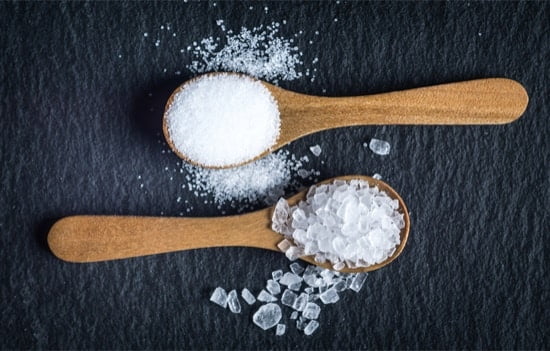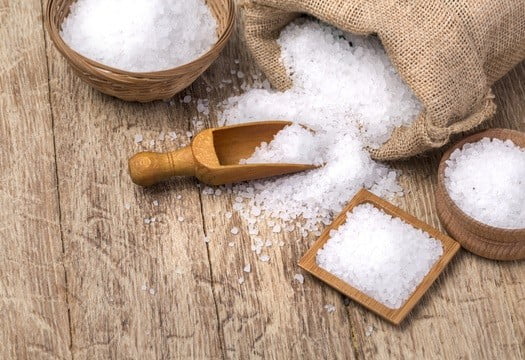Home remedies for bed bugs are very popular. Given that other treatments are so expensive, using salt to kill bed bugs would be the perfect solution. And there’s proof that it eliminate other pests.
Bed bugs have a waxy shell that prevents salt from drying them out. Salt can’t scratch that layer away to dry them. And since bed bugs can’t ingest anything but blood, you can’t poison them with salt. No mixture of salt with anything else, e.g., Epsom salt or borax, is more effective.
You need to use proven bed bug control methods. You can try salt—and we describe how you might be able to below—but be aware that there are better natural ways to kill bed bugs.
Why is It Believed That Salt Can Kill Bed Bugs?
There are reasons people believe that salt might be able to kill bed bugs:
- Salt is used to kill certain other pests, like slugs and snails. People make the association and think that it can kill bed bugs in the same way.
- Other powders, like diatomaceous earth, kill bed bugs. Diatomaceous earth is a natural way to kill bed bugs. Again, it’s a short leap to make the connection to salt.
- People kill bed bugs by drying them out, and the idea is that salt does the same. Heat treatments, for example, get rid of bed bugs.
It’s also alluring because salt is cheap and easy to use. And 99% of households already have salt available.
Does Salt Kill Bed Bugs?
There’s no proof that salt kills bed bugs. There are no scientific papers on the topic. There aren’t even any blogs that suggest it might work. It’s reasonably clear that it’s ineffective.
You’ll come to understand why salt doesn’t work. Bed bugs aren’t like other pests. They don’t ingest poisons, because they only ingest blood. And you can’t just cover them in a dry powder and expect them to dry out.
There are a few other reasons why salt is ineffective:
- Bed bugs know to avoid walking through things that might hurt them. Even if salt were toxic to them, they’d walk around it.
- Bed bugs are versatile. If you were to treat one area that they’re living, they’d move to another.
- Pesticides are slowly emitted from the areas that they’re sprayed. Salt sits there.
So, there’s nothing to suggest it works. And there are many reasons why it doesn’t measure up to other bed bug treatment methods.
Does Table Salt Work for Bed Bugs?
Table salt is perfectly fine for killing other pests, but not for bed bugs.
The reason why it won’t work is that people have a misconception about bed bugs. People think you can dry them out. And in a way, you can. Using diatomaceous earth is proven to dry them out.
But salt can’t do the same. It’s because diatomaceous earth doesn’t leech the moisture out of bed bugs, as some people believe. Instead, it scratches their shell. It peels and rubs away the coating of their exoskeleton. Without it, they dry out.
Table salt won’t do the same. Diatomaceous earth does so because it’s exceptionally rough at a molecular level. Table salt is quite rough, but not in the same way.
Does Salt Water Kill Bed Bugs?
Many bed bug treatment methods are sprays. Sprays are highly effective since they spread the toxic substance very widely. This means that the bed bugs can’t easily avoid walking through them.
The only problem is that salt water isn’t toxic to bed bugs. Here’s another misconception. If you were to drop a bed bug into a jar of salt water, they would die. But spray them in the stuff, and they’d be just fine. That’s because the water doesn’t poison them; it drowns them.
If you sprayed salt water on your mattress, it would have a few effects.
- The bed bugs would run away.
- They would hide elsewhere in the room until you stop trying to spray them.
- They would re-infest the mattress as soon as they’re able, i.e., from that night onwards.
Aside from that, though, it would do nothing. And it certainly wouldn’t kill them. Salt isn’t toxic to them, so salt water sprayed on them isn’t either.
Does Salt and Baking Soda Kill Bed Bugs?
Alternatively, you might have heard about using baking soda, or salt and baking soda mix. Salt and baking soda is a cure-all people use for cleaning, and even brushing their teeth.
In this context, the idea is that baking soda can dry bed bugs out by absorbing their moisture. But it can’t be done without breaking through their waxy shells. Baking soda can’t do that on its own. It’s the wrong texture.
There’s also nothing about salt and baking soda that’s any better than baking soda alone. Mixing salt with baking soda doesn’t produce some magical chemical reaction.
Does Borax and Salt Kill Bed Bugs?
Borax, or sodium borate, is another general-purpose cleaning powder/solution. However, unlike the others on our list, it is effective against some bugs.
According to the Journal of Economic Entomology, boric acid dust can kill 90% of a cockroach infestation in just 15 days. This was more effective than commonly used pesticides like sodium tetraborate and disodium octoborate. The only issue is that it’s difficult to spread around.
It works like this:
- When a bug walks through it, some of the borax sticks to their legs.
- When they next clean themselves, they ingest some borax by accident.
- It doesn’t kill them immediately, but it is a slow-acting poison.
In this way, borax kills cockroaches and similar bugs. But it doesn’t kill bed bugs. Bed bugs can’t ingest borax because they only eat blood. They don’t have a mouth. They have a long tube like a mosquito.
Because they can’t ingest it, the borax does nothing. There’s nothing about adding salt to borax that makes it any more effective. It also doesn’t dry them out.

Can Epsom Salt Kill Bed Bugs?
Epsom salt, or magnesium sulfate, is a kind of salt that’s again used for many purposes. It’s used in agriculture to add sulfur to the soil, it’s used in brewing beer, and it’s used around the home too. Some gardeners swear by it, in that it repels garden pests, although this isn’t proven.
As for whether it kills bed bugs, again, there’s no proof that it does. Epsom salt won’t dry them out. And since bed bugs can’t ingest anything but blood, it won’t poison them either.
No mixture of Epsom salt with table salt, borax, or anything else will help you kill bed bugs. You should stick to tried and tested means instead.
Does Salt in Bed Sheets Kill Bed Bugs?
The idea of putting salt in bed sheets to kill bed bugs might make more sense. The bed bugs are by necessity kept near the salt at all times. And there’s less room for them to avoid the salt grains.
However, it doesn’t make a difference. Bed bugs can easily avoid small salt grains in your sheets.
How to Kill Bed Bugs with Salt
If you were to kill bed bugs with salt, there would be many ways you could do so.
- You could spread the salt around the feet of your bed. This would prevent bed bugs from around the room reaching you to feed.
- You could spread the salt around entry and exit points. These include cracks in the wall or under the door.
- You could spread the salt around the bed bug’s typical harborages. These are places like under the mattress, or nearby furniture.
The only issue is that salt doesn’t work. However, you could use similar powders to achieve the effect you want. Without going into too much detail, pesticide powders and diatomaceous earth work well.
Does Salt Water Help Bed Bug Bites?
While salt can’t repel bed bugs, it may still be useful. Salt has long been utilized for its slight antiseptic properties. You might have previously used it on mosquito bites.
As for whether it works on bed bugs bites, there’s nothing to say it does. Bed bugs bites (and mosquito bites, too) are the result of inflammation. They occur because:
- The bug injects saliva into each bite
- This saliva has numbing properties, which stops the bite from stinging, at least initially
- It also contains an anticoagulant. This keeps the blood flowing, so the bed bug can keep feeding
- When the numbing wears off, the bite starts to itch
The itching is a result of the body’s natural response. When the body notices something that shouldn’t be there, the area becomes inflamed. This allows more blood to access the area, and therefore more white blood cells.
You don’t want to stop inflammation. Inflammation is a good thing in this context, because it allows the body’s natural defenses to work.
As for stopping the itching and pain that bed bug bites cause, salt water isn’t the answer. Even if it did have slight anti-itching properties, there are much better remedies out there. Anti-itching creams are very cheap and highly effective.


The biggest problem with table salt is that the granules are too big to penetrate the crevices of the bug’s body. If you put it in the blender and grind it up, or saturate water with it and soak your mattress repeatedly, leaving enough to make it noticeably rough, it might not kill them, but it will will keep them out while you kill them in other places (where harsher chemicals can be used). They might still crawl gingerly across it, but they won’t take up residence. As for the harsher chemicals, soap mixed with vinegar, or WD-40 easily kill them on contact. WD-40 (spayed in a circle-of-death pattern) can also keep them away for a surprising length of time. Bleaching cleanser, sprinkled into floor cracks and crevices, will keep them from using the gaps to travel and hide. Spraying WD-40 to wash bleaching cleanser into the cracks will create an even longer lasting hostile environment for them; the same thing would probably work with powdered salt, which will stay saturated with WD-40 for quite a while. Diatomeacious earth is great electrical outlets and switches, since it won’t corrode the connections. It’s also great for any hidden spaces that won’t get wet, since it will keep killing them indefinitely. The only thing I tried that proved almost useless were store-bought bug sprays and bombs, even those with screaming “bed bug” banners on the can; WD-40 is much more effective and cheaper. I’ve been rid of them for almost a year now, but it took some diligence; I kept a flashlight nearby for months. But all the nasty stuff left in the cracks of the floor, outlets and innards of the furniture will make it that much harder for them and easier for me if any other pests try to invade my house.
Can I vacuum them up in my shop vac them then kill them
What about flour salt? Or salt that’s ground up at the finest setting in a burr coffee grinder? Has anyone done testing with that?